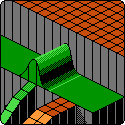|
I'm building my first linked list in C and I'm running into trouble. Whenever I have a function that returns a pointer to a node to the main file and I try to work with it I get a "dereferencing pointer to incomplete type" error. Am I doing something wrong with my header files? I've tried changing around where Node is declared but I can't figure it out.
|
|
|
|

|
| # ? Jun 10, 2024 10:40 |
|
This is probably the classic "how to use a datatype in a datatype that you're currently defining" problem. How are you defining your node struct?
|
|
|
|
Dijkstracula posted:This is probably the classic "how to use a datatype in a datatype that you're currently defining" problem. How are you defining your node struct? code:
|
|
|
|
code:MrMoo fucked around with this message at 08:44 on Dec 3, 2009 |
|
|
|
Change that code to code:
|
|
|
|
Thanks. Is there any reason you can't use the typedef in that situation?
|
|
|
|
teen bear posted:Thanks. Is there any reason you can't use the typedef in that situation? The error tells you why. It's an incomplete type (until the definition of the struct is finished).
|
|
|
|
fyi typedefs and structure tags have separate namespaces so you don't strictly need to name them differently, cf http://codepad.org/ILEfyF3L This doesn't mean you should, but you can
|
|
|
|
Mr.Radar posted:make sure you put it in the header file your main file includes.
|
|
|
|
Mustach posted:This is the only thing that he did wrong; his original typedef/struct is totally legitimate and doesn't need to be changed. Hm, yeah, you're right. That's what I get for answering questions about something I never actually use, and without actually consulting the spec (or even a compiler).
|
|
|
|
There are three C language rules interacting here. 1. Identifiers live in different "name spaces". First, every function has its own namespace of labels. Second, every struct or union has its own namespace of member names. Third, there's a global namespace of "tag" names used to identify structs, unions, and enums using the syntax (e.g.) struct NODE. Finally, there's an "ordinary" namespace containing every other use of an identifier, organized by the usual rules of lexical scope. 2. Tag names don't need to be pre-declared. If you write struct foo in the middle of some arbitrary code, and the C compiler hasn't already seen a type with that name in the tag namespace, then the compiler will implicitly declare an incomplete struct type named foo in the tag namespace, and as long as you don't actually need the definition of that struct type right now, everything is great. This is why you can write typedef struct NODE Node even before you've defined struct NODE: you're implicitly declaring a type named NODE, and the typedef doesn't care that the type is still incomplete. 3. Typedefs live in the ordinary namespace. This means that if you have a typedef named "foo", you can't have (e.g.) a variable in the same scope named "foo". It also means that typedef names are in a different namespace from tag names. This means it's legal to write typedef struct foo foo;, and it just means that, in this lexical scope, the ordinary name foo can be used to refer to the struct type named foo. It also means that there's not necessarily any relationship between a typedef named foo and a tag type named foo. So when you wrote struct Node* next;, the struct Node part actually (by rule 2) implicitly declared an incomplete struct type named Node, which (by rule 3) has no relation to the typedef named Node, and (most importantly) is completely distinct from struct NODE. EDIT: wait, there was some crazy edit going on here. rjmccall fucked around with this message at 07:00 on Dec 3, 2009 |
|
|
|
rjmccall posted:So when you wrote struct Node* next;, the struct Node part actually (by rule 2) implicitly declared an incomplete struct type named Node, which (by rule 3) has no relation to the typedef named Node, and (most importantly) is completely distinct from struct NODE. He didn't write that, though. Also, your explanation in (3) is inaccurate if by "the same scope" you are including inner scopes: http://codepad.org/ztM03RqI
|
|
|
|
Avenging Dentist posted:He didn't write that, though. Also, your explanation in (3) is inaccurate if by "the same scope" you are including inner scopes: http://codepad.org/ztM03RqI He did, but then he changed it in an edit. Also, no, I am not including inner scopes, because inner scopes in C allow arbitrary ordinary names from outer scopes to be shadowed. Compare code:
|
|
|
|
rjmccall posted:Also, no, I am not including inner scopes, because inner scopes in C allow arbitrary ordinary names from outer scopes to be shadowed. I'm sure you know that, but for the purposes of edification, I figured people should be aware of some of the weirdness that the symbol table in C is capable of.
|
|
|
|
Avenging Dentist posted:I'm sure you know that, but for the purposes of edification, I figured people should be aware of some of the weirdness that the symbol table in C is capable of. That is a good point. Behold the weirdness of C.
|
|
|
|
C++ Question. How bad of an idea is it to use this code: code:
|
|
|
|
Optimus Prime Ribs posted:C++ Question. That would work, but you shouldn't use exceptions for basic control flow. Just check against the size. Also, don't pass the vector around by value like that. code:
|
|
|
|
Well that's a hell of a lot more simple. Thanks.
|
|
|
|
Good news, everyone: clang is now capable of fully parsing its own source code. There is, I'm sure, a lot of work to be done for codegen, but it's a pretty big step towards being self-hosting.
|
|
|
|
Avenging Dentist posted:Good news, everyone: clang is now capable of fully parsing its own source code. There is, I'm sure, a lot of work to be done for codegen, but it's a pretty big step towards being self-hosting. Awesome.
|
|
|
|
Is type size_t always an alias for an unsigned integral type? So depending on the implementation it could be either an unsigned int or an unsigned long?
|
|
|
|
Avenging Dentist posted:Good news, everyone: clang is now capable of fully parsing its own source code. There is, I'm sure, a lot of work to be done for codegen, but it's a pretty big step towards being self-hosting.
|
|
|
|
DoctorTristan posted:Is type size_t always an alias for an unsigned integral type? So depending on the implementation it could be either an unsigned int or an unsigned long? ANSI C says yes. SUS adds ssize_t as the signed counterpart.
|
|
|
|
DoctorTristan posted:Is type size_t always an alias for an unsigned integral type? So depending on the implementation it could be either an unsigned int or an unsigned long? Or even unsigned long long, as on LLP64 platforms like Win64. But yes, it's always an alias for an unsigned integral type.
|
|
|
|
Question to the SFINAE experts. I'm trying to debug some code which works on both MSVC and GCC, but fails on ICC. Here's a watered down example which captures the essence of it:code:
|
|
|
|
The Red Baron posted:All function arguments are dependent on a template arg, so why does ICC 1) attempt to instantiate overloads with a mismatching arity and 2) whine when the overload fails? It seems to me this should work correctly. Looks fine to me, I'm pretty sure that's a compiler bug.
|
|
|
|
Just for a sanity check, you're sure argtype_lookup<BaseAbstract, 2>::type is not defined when BaseAbstract represents something of arity 1? Maybe you have a default template definition that defines it to void or something by accident?
|
|
|
|
That Turkey Story posted:Just for a sanity check, you're sure argtype_lookup<BaseAbstract, 2>::type is not defined when BaseAbstract represents something of arity 1? Maybe you have a default template definition that defines it to void or something by accident? code:
|
|
|
|
The Red Baron posted:It's defined as That's the problem right there. Regardless of whether or not that operation used in the definition of type is valid does not matter. SFINAE is substitution failure is not an error. If argtype_lookup's definition has an error when being instantiated that would still cause an error, which is correct compiler behavior.
|
|
|
|
That Turkey Story posted:That's the problem right there. Regardless of whether or not that operation used in the definition of type is valid does not matter. SFINAE is substitution failure is not an error. If argtype_lookup's definition has an error when being instantiated that would still cause an error, which is correct compiler behavior. This shouldn't be an issue if the compiler didn't attempt to instantiate overloads with other arities than that which is actually being called, since argtype_lookup should never fail for the correct type and arity. I'm honestly very puzzled as to why it does that. Any ideas?
|
|
|
|
The Red Baron posted:This shouldn't be an issue if the compiler didn't attempt to instantiate overloads with other arities than that which is actually being called, since argtype_lookup should never fail for the correct type and arity. I'm honestly very puzzled as to why it does that. Any ideas? The expression fancy.dostuff<mytype> is the part that causes substitution of mytype into the function template signatures, which is what determines the set of candidates. Only after that happens does overload resolution occur. The fact that you are passing a certain number of arguments does not affect this since that is handled after substitution takes place.
|
|
|
|
That Turkey Story posted:The expression fancy.dostuff<mytype> is the part that causes substitution of mytype into the function template signatures, which is what determines the set of candidates. Only after that happens does overload resolution occur. The fact that you are passing a certain number of arguments does not affect this since that is handled after substitution takes place. That explains everything, and I truly wish I had properly understood that aspect of SFINAE sooner. I replaced the lookup with this code:
|
|
|
|
The Red Baron posted:Now I'm left wondering why no version I've tested of MSVC or GCC have caught that issue at all Because the template implementations in MSVC and GCC are, respectively, terrible and mediocre. Chances are if ICC is giving you an error, you have a bug, since ICC uses EDG as a frontend (notable for being the only frontend that supports export template*). * But ICC disables this for good reason (it sucks)
|
|
|
|
Avenging Dentist posted:Because the template implementations in MSVC and GCC are, respectively, terrible and mediocre. Chances are if ICC is giving you an error, you have a bug, since ICC uses Comeau as a frontend (notable for being the only frontend that supports export template*). Well, ICC and Comeau both use the EDG front end. ICC does have some compliance issues that Comeau does not have.
|
|
|
|
That Turkey Story posted:Well, ICC an Comeau both use the EDG front end. ICC does have some compliance issues that Comeau does not have. Yeah, see my ninja edit. I got mixed up when I was typing it out.
|
|
|
|
I can't seem to find a C# thread, so forgive me if this is the wrong place. I have to make a very basic calculator (input a number, operator, and a number) for class that only accepts numbers between 0 and 1,000,000 and rounds the result to 4 decimal places. http://pastebin.com/m6fb0ee39 I know my code is probably in piss-poor format, I don't know much about coding folkways- my school teaches code first, then proper structure on how to make applications during the Bachelor's degree. Anyways, everything works good and proper except for the Math.Round(results, 4); in any of my functions. I can't seem to see what I'm doing wrong
|
|
|
|
Sab669 posted:I can't seem to find a C# thread, so forgive me if this is the wrong place. Read the documentation and look at the examples.
|
|
|
|
litghost posted:Read the documentation and look at the examples. And then hit up the C# thread.
|
|
|
|
litghost posted:Read the documentation and look at the examples. I did! I copy-pasted the C# example right from the example and then changed it so that it had my variable in place. That was the first link in google. csammis posted:And then hit up the C# thread. Thanks, I'll direct any future questions there instead.
|
|
|
|

|
| # ? Jun 10, 2024 10:40 |
|
Sab669 posted:I did! I copy-pasted the C# example right from the example and then changed it so that it had my variable in place. That was the first link in google. d Type: System.Decimal A decimal number to be rounded. decimals Type: System.Int32 The number of decimal places in the return value.
|
|
|






















